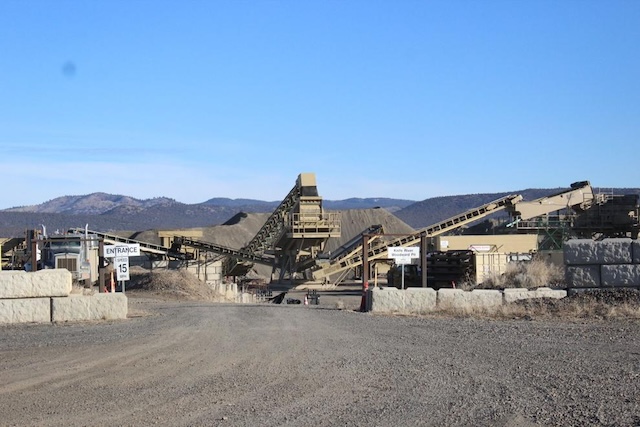Prineville groundwater tests planned to find contamination source
Published 9:10 am Friday, April 25, 2025
Prineville residents facing an ongoing groundwater contamination problem may soon get some answers about what is causing the problem.
A representative from the Oregon Department of Environmental Quality met with Crook County officials and residents Wednesday evening and outlined steps DEQ has taken thus far to determine the extent of the contamination, the source and what actions to take next.
“Two years ago, I came to a meeting to hear about this issue,” said DEQ Policy Analyst Greg Svelund. “It was the first time that I or the agency realized there was a problem with groundwater contamination in Crook County. From the very beginning, DEQ’s perspective on this has been that we don’t know what is causing this problem.”
Groundwater issue
Groundwater contamination first emerged about two years ago and at least 61 properties surrounding a Knife River Corporation aggregate mining site located on Stahancyk Lane in northwest Prineville have experienced groundwater issues.
The concerns initially prompted several of the neighbors to get water tests from Prineville-based Box R Water Analysis Lab, and what they learned is their groundwater had high levels of manganese and elevated levels of aluminum. The manganese levels ranged between 0.120 and 0.484 micrograms per liter. The Environmental Protection Agency says those metals should not exceed 0.05 micrograms per liter.
The mining site blamed for the contamination is 99 acres, located on property owned by late Prineville resident Craig Woodward. The mining operation was approved in a split vote by the Crook County Planning Commission in September 2015. Commissioners considered an updated list of more than 30 conditions for approval of the site, which were intended to mitigate the impact to nearby residents.
Then in July 2021, Knife River applied to expand the mining operation to include an adjacent 78-acre property owned by Robert and Lani Vanier of Dayville. Application was made, according to a Crook County Planning Commission document, because the aggregate reserve on the Woodward property is depleted.
The expansion was ultimately approved, although no mining can take place until Knife River receives permits from the DEQ and Oregon Department of Geology and Mineral Industries DOGAMI, both of which have jurisdiction governing groundwater impact.
DEQ plans
Svelund noted that the DEQ first pursued a comprehensive sampling and analysis plan that would look at the groundwater not only on and near the mining site but throughout the entire basin.
“This plan is basically what the state thinks that we need in order to answer the question of source,” he said.
However, DEQ was unable to secure funding from state and federal sources to pay for the approximately $1.5 million plan. With that avenue essentially closed, the DEQ pivoted to other methods of answering groundwater contamination questions.
“The DEQ went to the Legislature and asked for domestic well sampling (funding) and we were successful in that twice,” Svelund said. He went on to note that they tested the wells of 61 affected households this past fall and will test them again within the next week.
The testing will initially focus on health, which state and county officials consider the most pressing concern. Data will go immediately to residents, Crook County Health Department and the Oregon Health Authority.
“The Oregon Health Authority is going to be doing what’s called a letter of health consultation, which looks generally at all the collective data from the 61 homes and looks at the risk of drinking the water,” Svelund explained. “They will be doing that as soon as the second round of data is collected.”
Investigating of mining site
While the first two phases of the domestic well testing aren’t expected to determine a source of the contamination, a groundwater investigation planned for the Knife River mining site could achieve that goal.
DEQ and DOGAMI wrote a letter to Knife River saying they will compel a groundwater investigation. Svelund said the point of the investigation is to determine whether Knife River is contributing to or causing the contamination.
A work plan for the investigation will be finalized in the next couple of weeks and will entail quarterly and monthly testing of multiple wells installed on and near the mining site property. Ordinarily, the state would require Knife River to conduct all the testing and supply the data, but with this investigation, other entities will be conducting their own well tests.
“It’s not a surprise there is likely going to be trust issues with Knife River collecting data,” Svelund acknowledged. “So, the state took a somewhat unusual step that there is going to be secondary samples collected from the site.”
The DEQ lab and Environmental Protection Agency will be collecting test samples, and Jim Newton of Cascade Geoengineering, LLC, whom residents have already turned to for help with the contamination issues, will also be allowed to collect test samples.
“We really want there to be trust in that data,” Svelund said. “We want this answered today, and I am confident that with the groundwater investigation especially, we have concrete steps in the very near future to get the answers that we have wanted to get for a year and a half.”







